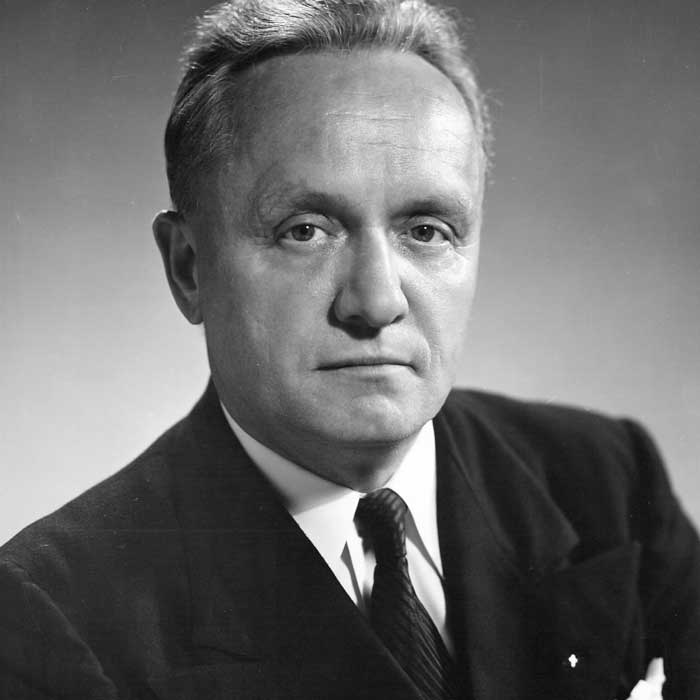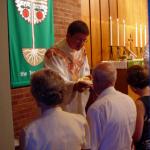Not long after I became a Lutheran, I visited the Evangelism museum at the Billy Graham Center in Wheaton, IL. Among the exhibits of George Whitfield, Dwight Moody, Billy Graham, and other figures prominent in the “History of Evangelism in North America,” I was surprised to see an exhibit about the Lutheran Hour and its first speaker, Walter A. Maier. I didn’t realize a Lutheran and a Lutheran ministry would be in this company. The gift shop had some cassettes for sale of Maier’s sermons from the Lutheran Hour radio program, which I had to buy. (This was quite a few years ago, as you can tell from the primitive technology I am referencing.)
When I listened to the tapes, I was blown away. This man could evangelize! Maier’s sermons were forceful, eloquent, and compelling, filled with Biblical insights and masterful applications of Law and Gospel.
Later, I met someone who asked what church I went to. When I told him I was a Lutheran, he started going on and on about how much he liked the Lutheran Hour, saying it’s the best Christian program on the radio. So I started listening to it myself from time to time, and all of the speakers that I heard have been outstanding.
But I never realized the importance and the impact of that program until the journal Religion & Liberty asked me to review a book by historian Kirk D. Farney entitled Ministers of a New Medium: Broadcasting Theology in the Radio Ministries of Fulton J. Sheen and Walter A. Maier. He shows how this Catholic priest and this Lutheran pastor–both intellectuals, academics, and theologians–achieved such enormous popularity in the new medium of radio that they made their “foreign religions” acceptable to Americans and helped reverse the decline in American religion known as the “Religious Depression” that in many ways was worse than what we are experiencing today.
Read my review in its entirety for the details. Here is the introduction. Click the link to read the rest. (I’m making this a free post, meant to be forwarded and passed around, since non-subscribers too need to know about this book.)
Sheen and Maier: Broadcasting Theology
Religion & Liberty, Vol. 34, No. 2
Broadcast radio, an information technology that emerged in the 1920s, created America’s first electronic mass medium. As Americans from across the country and from all walks of life had access to the same news, information, music, and entertainment, the nation was brought together in a common popular culture.
In fact, much of today’s popular culture goes back to radio, as the national radio networks NBC, CBS, and ABC made the transition to the new technology of television by putting its programming (soap operas, variety shows, news reporting) and its stars (Jack Benny, Bob Hope, Lucille Ball) onto the screen.
Two of the most popular radio programs between 1930 and 1950 were The Catholic Hour, featuring (then) Fr. Fulton J. Sheen, and The Lutheran Hour, featuring Pr. Walter A. Maier. Some 15 million listeners tuned in every week to hear a sermon from this Catholic priest and this Lutheran pastor. (By way of comparison, today, with our much larger population, Fox News has 1.7 million viewers.) Both The Catholic Hour and The Lutheran Hour had a bigger audience than did Jack Benny, Bob Hope, Charlie McCarthy, or Frank Sinatra.
One might assume that America of the ’30s to ’50s, a time span that included the Depression and World War II, was just more interested in religion than it is today. But this was also the time of what historians call the “American Religious Depression,” when churches declined dramatically in membership and cultural influence.
So why were Sheen and Maier so popular, especially since they were both spokesmen for “foreign” churches that had been regarded with suspicion and bigotry?
In his book Ministers of a New Medium: Broadcasting Theology in the Radio Ministries of Fulton J. Sheen and Walter A. Maier, Kirk D. Farney takes up that question. In doing so, he makes his book a valuable resource for Christians interested in bringing America out of its current “religious depression.”













